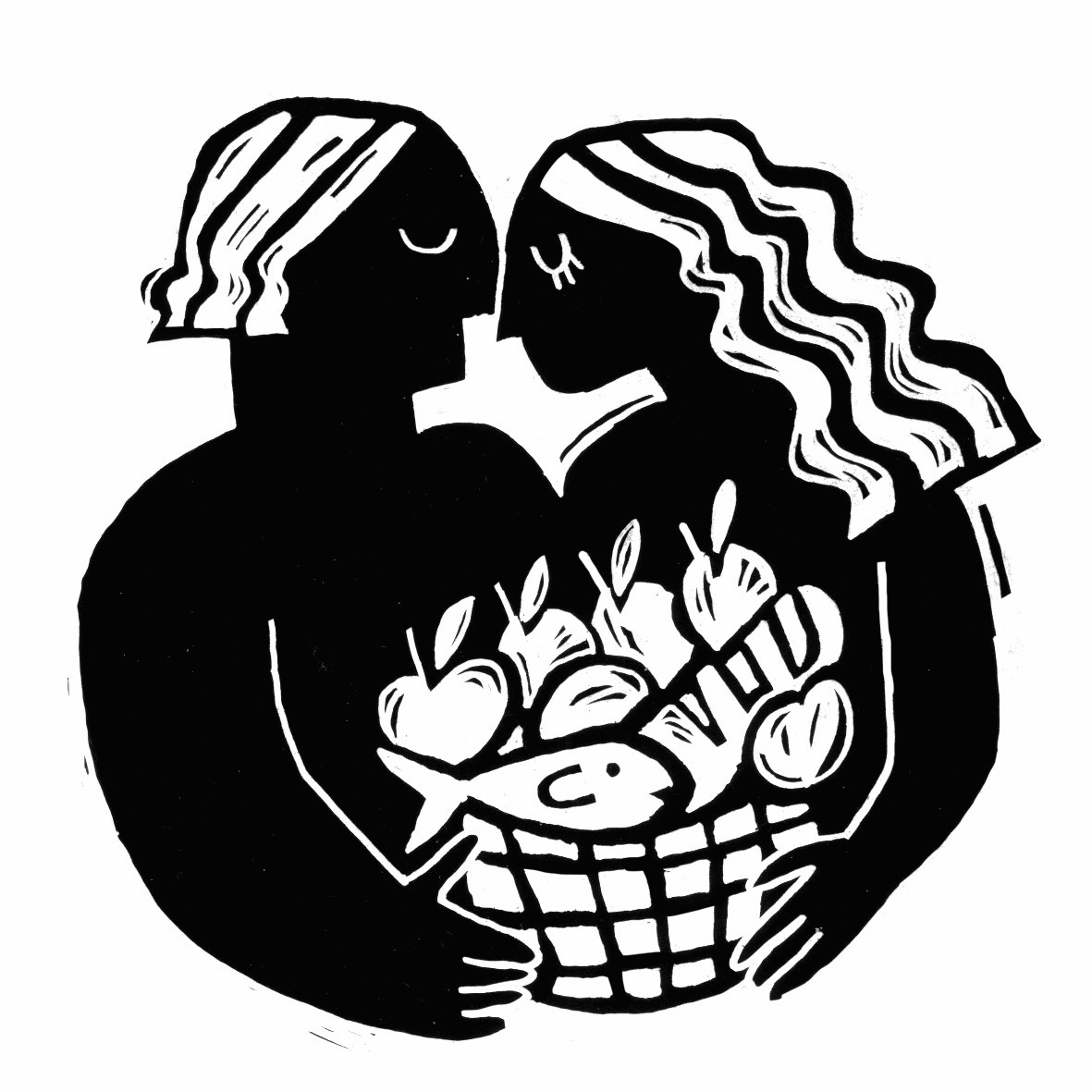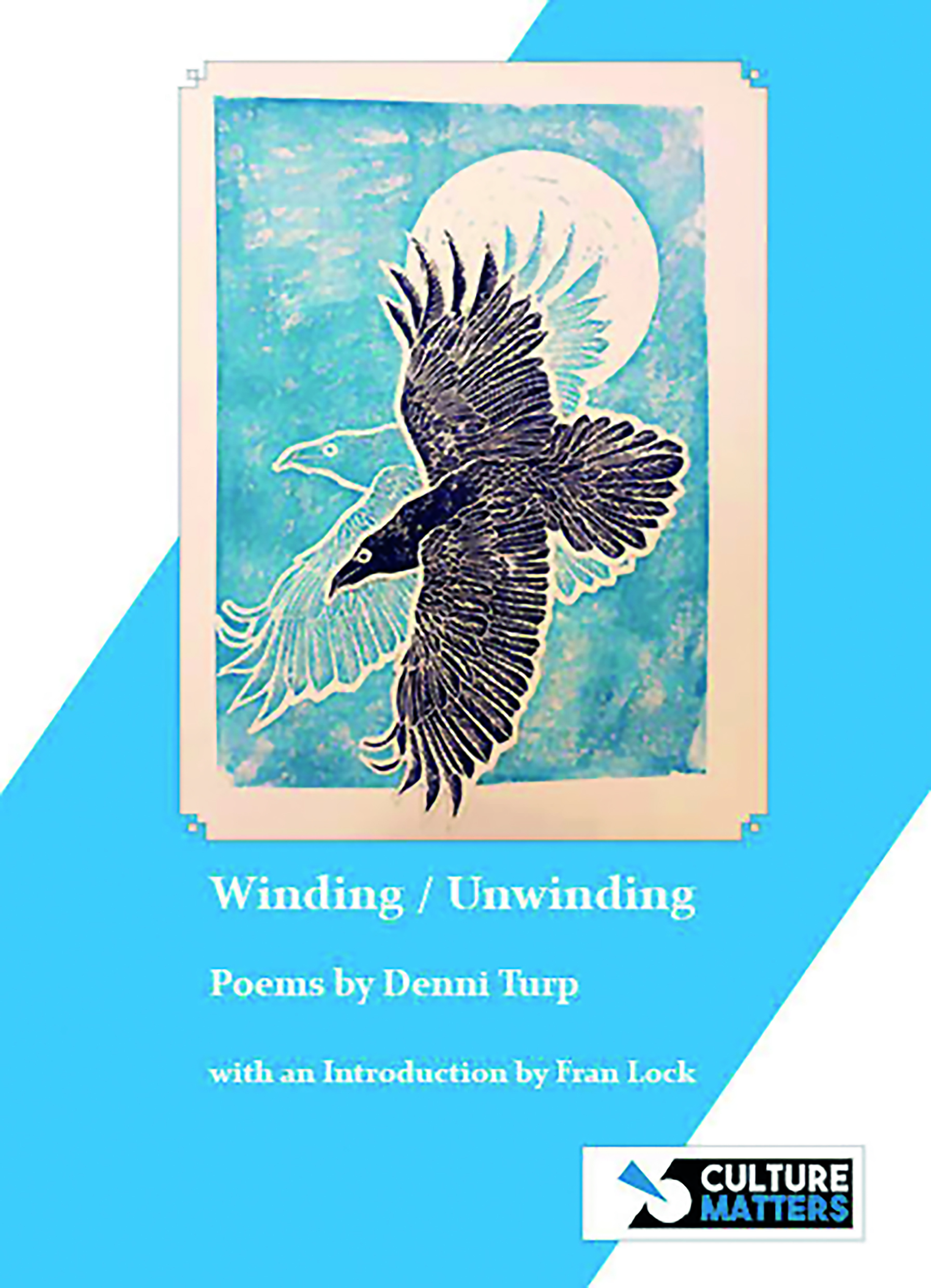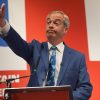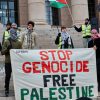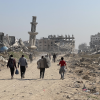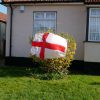
Franco’s troops, Madrid,1936; Netanyahu’s troops, Gaza, 2025
By Nick Moss
This is a review of two recent books published by Culture Matters – Michael Rosen’s Words United, and Alan McGuire’s The Last Days of Alicante. Both are attempts at direct engagement with the politics of our time, and both consider what might be the purpose of ‘political writing’ – of cultural intervention – given the amount of verbiage expended in covering up or directing us away from the crimes committed by capitalism in its own defence.
We live in a time when what gets called the ‘culture wars’ is more and more revealed as class struggles conducted by Capital at the level of ideology, but now dripping in the blood of the Gazan genocide, which it attempts constantly to conceal. Thus the present task, for those of us who are engaged in cultural production on the other side in the culture war, is to ensure that the evasions and prevarications do not take effect, that the genocide remains in plain sight and resistance to it continues.
The notion of ‘neutrality’ has become an essential element of how this fight is conducted, with the BBC moving to censor Kneecap and Bob Vylan, and refusing to screen Gaza: How To Survive A War Zone and Gaza: Doctors Under Attack. Over 600 prominent figures from the arts and media, including British film director Mike Leigh, Oscar-winning actor Susan Sarandon and Lindsey Hilsum, the international editor of Channel 4 News, signed an open letter criticising the BBC for withholding the Doctors Under Attack documentary:
We stand with the medics of Gaza whose voices are being silenced. Their urgent stories are being buried by bureaucracy and political censorship. This is not editorial caution. It’s political suppression. The BBC has provided no timeline, no transparency. Such decisions reinforce the systemic devaluation of Palestinian lives in our media.
A 19 May 2025 article in Media Lens noted:-
Karishma Patel, a former BBC researcher, newsreader and journalist, wrote earlier this year about her reasons for leaving the BBC. She observed ‘a shocking level of editorial inconsistency’ in how the BBC covers Gaza. Journalists were ‘actively choosing not to follow evidence’ of Israeli war crimes ‘out of fear’.
In a follow-up article last month, she observed that:
many [BBC] journalists are afraid to speak their minds – to challenge editorial decisions or speak freely to powerful presenters and executives. This isn’t a newsroom environment conducive to robust journalism – a profession all about the pursuit of truth and accountability.
She added:
It’s important the public understands how far editorial policy can be silently shaped by even the possibility of anger from certain groups, foreign governments, our own government, mega-corporations – any powerful actor – and how crucial it is that more junior journalists who see it can speak up.
Karl Marx, we should note, was clear that the basis of the communist critique of ideology did not operate on the same basis as that proffered by utopian socialists, who were invested in:
..the requirements of truth; not the interests of the proletariat, but the interests of Human Nature, of Man in general, who belongs to no class, has no reality, who exists only in the misty realm of philosophical fantasy. – Tucker, Robert C., ed., The Marx-Engels Reader, 2nd ed. (New York: W. W. Norton & Company, p. 494)
Communists in the circumstances of the day will always be forced to take a side, to identify and to pursue the actual interests of the working class in relation to the reality of the struggles of their times. In the Preface to A Contribution to the Critique of Political Economy (Moscow, 1970 p. 21) Marx comments on the conflict between material forces and the relations of production manifesting itself through class struggle, and goes on to refer to the ‘legal, political, religious, artistic or philosophic – in short, ideological forms in which men become conscious of this conflict and fight it out’. How then, does poetry help us to ‘become conscious’ and how might it contribute to how we ‘fight…out’ the class struggle at the level of culture?
Words United

Michael Rosen’s book uses poetry to expose the double meaning (and double-crossing) inherent in the language we use and manufactured for us to use. It reminded me of Raymond William’s classic book Keywords (Fourth Estate Ltd., February 1988) which does something similar, exposing how words carry their own history, how they are made to function as tools for clarity or obfuscation.
Michael Rosen’s brilliant, funny books for children have meant that his writings for adults are sometimes passed over, but he has always been a sharp-edged observer of contemporary life. His autobiographical writings – both his COVID memoir Many Different Kinds of Love (Ebury Press 2022) and his autobiography So They Call You Phisher! (Verso 2023) are quietly, gently, very profound.
In his introduction to Words United, Rosen sets out what motivated the book, and what possibilities he believes may be inherent in the practice of poetry, faced with the slaughter of more than 57,000 people by a state armed by, and a proxy for, the Western powers in the Middle East:
I’ve felt drawn to the disaster going on, desperately wanting to find words to make the events feel less overwhelming. And I’ve wondered, could words puncture the armour that surrounds our politicians as they engineer war, starvation and mass killing? I can’t answer that question other than to say, I hope so. Then again, I ask myself, couldn’t there be a function for words, other than this one of hurling pin pricks? Might it not be possible—a bloody good idea even—that people like me put words down so that they can bring us together to help us fight the nightmare?
The writing has 2 functions – to expose, and to unite. Does the book succeed in its aims? Can it serve as a guide for others in approaching the same tasks?
I think Words United is exemplary in both respects. The poems are constructed plainly; the language is simple, but the anger is present throughout. Some of the poems are terse, but work perfectly as devices to unmask bullshit:
Headline from Israel: ‘The Minister for Social Equality’ calls for a new Nakba.’
I thought George Orwell must have written that. – p1
Some people don’t like the word ‘Islamophobic’.
I’m trying to think of another word that describes ‘attacking a mosque’
or ‘attacking people because they “look Muslim”.’ – p2
So the way to stop people killing children is to kill children? – p6
A new verdict on antisemitism claims that if you’re left-wing and you talk about rich people, you are secretly, unconsciously, subconsciously in an unaware way being………..antisemitic.
The unaware bit here seems to be that the people deciding that this is an unaware way to be antisemitic are unaware of the fact that them linking rich people with Jews is antisemitic. – p6
Rosen’s main weapon is a furious irony, that mocks drily the absurdities of political cant. If words are weapons, then Rosen’s skill is in exposing the camouflage that tells us that these are not weapons, just harmless statements of fact, no need to trouble ourselves, just carry on with business as usual.
Palestinians don’t count.
Palestinians don’t have names
Palestinians aren’t Palestinian.
Palestine isn’t Palestine.
Palestine wasn’t Palestine.
There is no such word as Palestine.
There is no such word as Palestinian.
The land (that the people who say they are Palestinian call Palestinian land)
is not Palestinian land.
The house (that a person who says they’re Palestinian, is a Palestinian house),
is not a Palestinian house.
In fact, the house is not a house.
In fact, the person is not a person.
Palestinians don’t count. – p14
Sometimes, Rosen is unable to contain his rage, and the poems are particularly effective when the ability to pick apart the doxa of these times of genocide fuses with appalled horror at what is occurring in front of our eyes. The lucid simplicity of the writing gels with the limpidity of the articulation of political anger and it is impossible at this point to think of a better, clearer expression and indictment of how a war crime might be obscured by simply writing out of history the facts of what took place:
Don’t Mention the Children
Israel bans radio advert listing names of children killed in Gaza (Guardian 24.07.14)
Don’t mention the children.
Don’t name the dead children.
The people must not know the names of the dead children.
The names of the children must be hidden.
The children must be nameless.
The children must leave this world having no names.
No one must know the names of the dead children.
No one must say the names of the dead children.
No one must even think that the children have names.
People must understand that it would be dangerous to know the names of the children.
The people must be protected from knowing the names of the children.
The names of the children could spread like wildfire.
The people would not be safe if they knew the names of the children.
Don’t name the dead children.
Don’t remember the dead children.
Don’t think of the dead children.
Don’t say: ‘dead children’. – P 21
Not everything in the book is to my taste. Some of the shorter poems can be a little glib and can feel like they are thrown onto the page as bits of junk from a stand-up routine. I’m not sure we need as much of this kind of writing as we’re given:
I got attacked by a lawn once. It was OK.
I wasn’t bothered because I know that the pen is mightier than the sward.
I read a book recently about singing. It wasn’t much good.
I ended up thinking that I didn’t like the tome of voice. – p8
A journalism of communist fury
There are probably too many poems in the book, so that some of the most powerful work is in danger of being buried. Teachers will enjoy Rosen’s various gibes at Michael Gove, but the risk is always that like so much political verse, it can become tomorrow’s fish and chip paper. Gove is really yesterday’s man, and a different government is now in place, with different plans to fail children in other ways.
But when Rosen vents his fury at the conspiracy between Trump, Netanyahu, Starmer et al. to deny what is occurring in Gaza, while bankrolling it, there are few who can match him. Again, it’s the simplicity that hits home. Faced with a crime covered over by lies and obfuscation, he refuses to overdress his poems – he just says what is. Because that’s in fact enough to make the carapace of deception crack. The lies about Gaza do not form a nuanced shield – the crimes are pretty much all in plain sight. What matters is creating the belief that we can do nothing to prevent them. That the state of Israel, backed up by the US and Europe, with the complicity of the Arab states, will be able to act unhindered. The sheer size of the anti-war movement, and the knee-jerk fearful proscribing of Palestine Action, suggest otherwise.
Michael Rosen has chosen to write again and again about the genocide. To keep looking, keep arguing, keep marching. His poems are rallying cries for all anti-imperialists and anyone of good conscience who does not want to be a party to mass murder. One difficulty all creative workers face, in trying to respond constantly and rapidly to events, is that repeatedly documenting a genocide in real time is exhausting and soul destroying. Staying part of a wider movement is crucial to maintaining a resilient militancy.
In times like these, we have to be prepared also to sacrifice a concern for aesthetic quality to political urgency. Our music, our poetry, our writing may take on a journalistic aspect, but so what? Let it be a journalism of communist fury that never ceases to engage with the crises of its times. Michael Rosen’s work is a powerful example of what poetry can be when it refuses to collude and refuses to stay silent. All profits go to Medical Aid for Palestine. Michael Rosen, a Professor of Children’s Literature at Goldsmiths for over a decade, is taking a risk in stating his position so clearly in a climate of censorship and proscription. You can’t imagine Simon Armitage doing so, about anything to be honest.
Rosen will not let the genocidaires off the hook :-
The words of politicians
I can see it now:
politicians welcoming the ‘transformation’
of Gaza
into what they’ll call a ‘new development’
and a ‘regeneration’
and when people say
that the foundations of the hotels
and new apartment blocks
are built on blood,
they will sigh
with the sigh
that has been heard again and again,
ever since many of the first nations of America and Australia,
‘disappeared’
and they will rush to remind us
of how good and kind they were,
‘We called for a ceasefire,’ they will say
knowing full well
that these were merely words,
words that were said while they were busy
supplying the kind of help,
that ensured that the foundations of the hotels
and new apartment blocks
were built on blood – pps 41-42
The Last Days of Alicante

Alan McGuire’s The Last Days of Alicante takes a different approach to the resurgence of fascism by looking closely at the history of Alicante as the last holdout of Republican Spain. This is Alan’s first collection, and it suggests he is an exciting new voice – one committed to articulating the hopes of working-class people, despite defeat, and in the face of fascist atrocity. He is a former mental health nurse from Swindon, Wiltshire, now based in Madrid, and is inspired by the Merseyside poets, Walt Whitman, Pablo Neruda, and Hollie McNish. He is an Associate Editor at Culture Matters, and runs the Sobremesa Podcast, focusing on contemporary Spain.
The poems are written in dialogue with Miguel Hernández, the communist shepherd poet from rural Orihuela. The inspiration of Hernandez is apparent, but there is the mark of Lorca also. I don’t think Lorca translates particularly well into English, but his influence is present here and his symbolism informs Alan’s poetic language, as in Fluid (p3) where he writes :-
My heart explodes with petals
flooding the floor in front of me
The power of Lorca’s flower imagery can be diminished by bad translation, but McGuire has found a way to seize on such imagery and employ it effectively and coherently as his own, whilst retaining the intoxicating charm that the Spanish poets usually have stripped from them in translation to English. This is not to suggest that his work is a pastiche of Lorca – far from it. He draws on the kind of imagery deployed by Lorca and Hernandez and incorporates it into his own lexicon to great effect – this is not influence but inspiration.
The most powerful poems deal with the way in which the Spanish Civil War still haunts Alicante. The Central Market was bombed on 25th May 1938 by the Spanish fascists, killing 300. The Plaza 25 de Mayo, also known as the Plaza de las Flores, forms a memorial at the rear facade.
Mercado Central
shoppers buy flowers
for their graves
red petals fall with dust
from the bombs
flowers wilt in the heat
stems snap as screams
fall silent
reflections of scars in glass shards
iron girders groan
as life leaves…
The sirens never sounded
Alicante is always infected by the past; always scarred by what was done to its people by Franco’s army. Alicante was the last city loyal to the Republican government to be occupied by Franco’s troops on 1st April 1939, and its harbour saw the last Republican government officials fleeing the country. McGuire pays a spirited, beautiful tribute to Archibald Dickson, captain of the SS Stanbrook, who rescued thousands of Republican families on 28 March 1939, while the city and port were subjected to a frenzied hail of Nazi bombs.
The Last Days of Alicante
as they drifted away from Alicante
the bombs began to drop, the worst he’d seen
days later eighty thousand Italian fascists
arrived for republic’s fall
the Stanbrook, the 30 year old steamer ship
got away with women, men and kids
but left behind so many more
condemned to camps and the worst of all…
a thousand men had to live on the boat
then a camp with little hope
some fought hitler and mussolini too
never again to see their homeland of sun
living in exile until franco died
his head on a pillow
Alicante exemplifies the unfolding of non-history for a period in Spain. All social progress crushed or halted in its tracks. Franco’ s gamble on mass tourism that turned the coastal villages into real estate goldmines for some, and poverty-wage service provision for others. The Catholic church spreading its misanthropic, misogynist tentacles through society again. The clock running backwards. McGuire’s image of Franco dying cossetted on a pillow is a striking one. (I’d argue that history in fact recommenced in 1973 with the assassination of Franco’s Prime Minister, Luis Carrero Blanco.)
Alan McGuire’s powerful first collection shows that poetry can make connections between past and present, can show that the malignancies of fascism are always skulking around, searching out working-class dissatisfaction and turning it against itself, looking for a rebirth. Vigilance is essential; recognising that the past, as Faulkner had it, is never past, is crucial. And always, as Fran Lock puts it in her excellent introduction, as a description of McGuire’s practice, looking to ‘reintegrate political theory into ordinary life in accessible and vigorous ways…’ and arguing for ‘the urgency and seriousness of living.’
Both books are available here.






